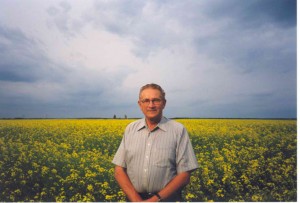
Canola is also known as Rapeseed. Its seeds are crushed to make vegetable oil.
Since we’re only a few days past Independence Day, I thought I’d take a look at the borders between the dominion of the public and the gated garden of the private. In 1998, multinational industrial agrichemical giant Monsanto discovered that a Canadian farmer named Percy Schmeiser was growing its Roundup Ready Canola in his fields. The seeds that grow into our food have generally been considered public property. That is, our foods are held in common by allhumans; no one person or company can own the seeds that sustain civilization.
Monsanto had the U.S. Plant Variety Protection Act of 1970 at their back, though. That law gives companies the right to exclusively own the DNA of the plant varieties they develop. That right of ownership includes the sole right to “reproduce” the plant, i.e. to generate the seed from which the plants grow. That means that a farmer or gardener is forbidden to save the seeds produced from one year’s crop in order to plant the next year. Schmeiser was growing Monsanto’s genetically-modified (GM) plants without paying for them.
But Schmeiser hadn’t ever planted Roundup Ready Canola. Pollen from someone else’s Roundup Ready had been blown on the wind into Schmeiser’s fields, contaminating the DNA of his crop. The contamination suddenly made an unknowable number of his plants the legal property of Monsanto, and once that contamination had been released, there was no way to keep it from spreading to all of his plants. The canola variety he had worked forty years to develop was destroyed.
So, presumably making lemonade because lemons had been forced upon him, Schmeiser saved all of that new GM seed and went about planting the next season as he had done his whole life.
“If I would go to St. Louise and contaminate [Monsanto’s] plots—destroy what they have worked on for forty years—I think I would be put in jail and the key thrown away,” Schmeiser told a reporter.
Monsanto, though, was aggrieved. They snuck onto his farm, took seed samples, and sued. They’d done the same to scores of other farmers, but, unlike those other farmers, Schmeiser refused to settle. The case went to Canada’s Supreme Court, where it was ultimately decided in Monsanto’s favor in a 5-4 decision. The law states that the ways patented DNA gets into a farmer’s crop is irrelevant. Once it is there, a farmer no longer owns his crop. Monsanto does.
That case only considered Schmeiser’s illegal use of Monsanto’s proprietary DNA, though, not Monsanto’s contamination of Schmeiser’s livelihood.
In 2005, the Monsanto crop again found its way into Schmeiser’s field, and the farmer demanded Monsanto come and clean up their mess. The company agreed to, but only if Schmeiser signed a gag order and a release absolving them of all responsibility for future contamination. Schmeiser again refused to play ball. He paid his neighbors $640 to work with him pulling up 50 acres of the plants by hand. Then he sent Monsanto the bill. Monsanto agreed to pay if Schmeiser signed the release.
So the farmer and his wife sued one of the biggest companies in the world for that paltry sum. This time, the issue wasn’t a matter of legal ownership, but legal responsibility. If farmers are powerless to keep patented DNA our of their fields—and if the  creator of that patented DNA is powerless to do so as well—then that creator must bear the burden of responsibility for how that proprietary DNA affects others. Monsanto first argued that the farmers growing the contaminating crops bear that burden of responsibility. The courts didn’t buy it. Then Monsanto argued that the government was responsible because it approved the patented DNA crops for sale. They still didn’t buy it.
creator of that patented DNA is powerless to do so as well—then that creator must bear the burden of responsibility for how that proprietary DNA affects others. Monsanto first argued that the farmers growing the contaminating crops bear that burden of responsibility. The courts didn’t buy it. Then Monsanto argued that the government was responsible because it approved the patented DNA crops for sale. They still didn’t buy it.
And then Monsanto paid up, setting a precedent that they continue to pay large sums of money to attempt to overturn: a company cannot tinker with biodiversity and the food supply without taking some responsibility for the results of that tinkering. They still can, however, force their agricultural product on others and subsequently claim what they have contaminated as their own. There is currently no legal safeguard that prevents a company from infecting our shared seed supply and then owning that supply. In fact, the law expressly allows for just that.
So let’s call it half of an Independence Day.
Check back on Thursday, July 12th to read up on the ways U.S. Chief Justice John Robert’s Decision on the Affordable Care Act might affect our food supply and agricultural DNA.

Pingback: Community News: Chief Justice Roberts on Your Fruits and Veggies | Pitchknives and Butter Forks
Pingback: Dead Man Gnawing: Man Made Maize and the Gods Made Man (3,700 B.C.) | PitchKnives and Butter Forks